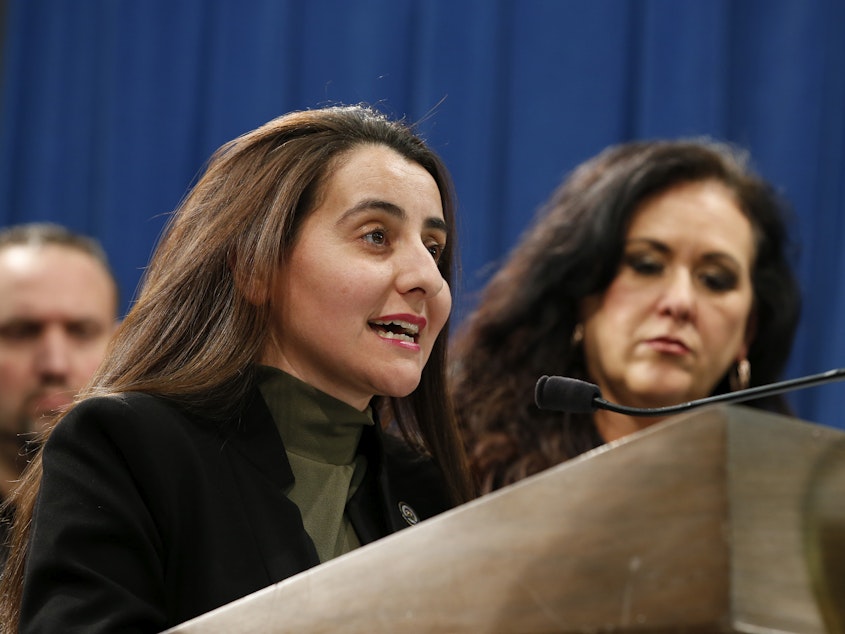New California Financial Watchdog Would Take Aim At Predatory Lenders Amid Pandemic

Lawmakers in California are rushing to create a new financial protection watchdog agency by the end of the month. They say it's needed because, under the Trump administration, the main federal regulator has been paralyzed.
And they say that during the pandemic that is leaving millions of Americans who are in dire financial straits more vulnerable to predatory lenders, get-out-of-debt-scams and other wrongdoing.
One study last year found that the federal Consumer Financial Protection Bureau's enforcement activity plunged by 80% from 2015. And money returned to consumers dropped by 96%.
"We are now as states left to do the work ourselves," says California Assembly member Monique Limón.
Along with Gov. Gavin Newsom, she is proposing to create the new state watchdog agency, which would be called the Department of Financial Protection and Innovation. But a legislative deadline means they need to do it by Aug. 31.
"Consumer protections are an area where California wants to show that we care," Limón says. "As the fifth-largest economy in the world we think that it is very important and it's the right thing to do."
The new agency would give the state broader power and ability to police aggressive debt collectors, credit repair schemes, predatory lenders and other shady financial practices.
Limón proposed the agency before the pandemic. But she says given the economic fallout, the need for more oversight is greater now.
"The timing of it is even more important," she says, noting that since the Covid outbreak, consumer complaints about financial wrongdoing in the state are up 40 percent. State officials say some of those complaints are about mortgage companies, personal loans, and companies that promise to help people get out of debt.
A long list of fair lending and consumer protection groups are backing the proposal. With upwards of 8 million people applying for unemployment in California alone, "many people are teetering on the brink of insolvency here," says Suzanne Martindale , who works on policy issues for Consumer Reports.
"A bad loan, a risky payday product, an aggressive debt collector, that can push someone over the edge into poverty, into bankruptcy and homelessness at the worst possible time in the middle of a public health crisis," she says. "So, the case is even stronger now."
Financial firms of course are not usually big fans of additional regulation. But Beth Mills with the California Bankers Association says she supports the new agency better policing some of the banks' competitors.
She says many online lenders for example face much looser regulations than the banks do.
"We would welcome greater regulation on them to make sure that we're operating under the same rules," Mills says.
But when it comes to the companies that her group represents — which she says are most of the large and small banks and lenders in the state, she says, "we would like to be exempt from the bill because the banks and financial institutions that we represent are already very heavily regulated at both the state and federal level."
And it appears the financial firms have the ear of some lawmakers. A group of moderate Democrats is pressuring Newsom to allow for large carve-outs for many financial firms, a source close to the negotiations over the proposal tells NPR. And that could weaken the new agency's ability to go after companies who take advantage of people.
Richard Cordray, a former director of the federal Consumer Financial Protection Bureau, says that would be a big mistake.
"I don't think that the legislature should make it hard for consumers to get their money back when they've been victimized by unfair, deceptive and abusive practices," says Cordray, who has been consulting on the bill.
Cordray says, if it's done right, the new agency could be a model for other states for how to have a tough financial watchdog agency of their own. And he says Congress envisioned that when it created the federal CFPB under the Dodd-Frank financial reform act.
"The financial reform law," he says, "had an implicit promise in it that there would be consumer financial protection at the federal level, but there would also be room for significant consumer financial protection at the state level and that the two could work in partnership."
He says it also envisioned that, "if one was doing its job and the other was pulling back, there still would be protection for consumers." Cordray says this new agency could live out that promise.
But, a legislative deadline means the bill has to get passed by the end of the month if the agency is to be created this year. There's a key hearing with lawmakers over the weekend.
Technically, the new agency would be created by restructuring and expanding the size and authority of an existing agency called the Department of Business Oversight. [Copyright 2020 NPR]



